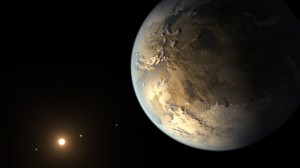Living on a different planet sounds exciting, right? I think of a space ship finally landing on its far traveled destination and discovering completely a new environment. This picture above is an artist’s depictions of Kepler-186f, a newly found Earth-size planet orbiting inside a red dwarf star’s habitable zone. It’s rocky, it might have water, it might even have life, but could we, evolved through Earth’s distinct conditions, ever thrive there? It’s likely not.
We may not have to travel light-years away to find a new planet- ours is transforming right before our eyes. Bill McKibben describes this new planet we are creating, Eaarth, in his book of the same name. This new world is plagued by drought, fires, and storms. The planet, as before, is primarily covered in water, but this time, the pH is slipping down, the temperature is creeping up, and the coastline is rising to cover the many cities of humans. Everything’s changing. The rise in global temperature means that the mountain pine beetle can survive through the winter and kill trees in the western United States. These huge tree kills increase mudslides and erosion and decrease forest carbon uptake. The snow and ice in Greenland and the Arctic are melting, swallowing up small island nations like the Maldives in the process. Other places become deserts. Depending on the nation’s affluence, people must either spend more money on desalination plants or spend more time traveling to gather water. Crops are frozen, parched, and diseased, increasing food costs and human starvation.
This new planet no longer seems exciting; it is menacing. The current seven billion humans that depend on a hospitable planet to are actually very temperamental. How do we survive this new planet? McKibben wants us to think small. We must shrink our economy, limit growth, and give our tired planet some space. New planets have new limitations and restrictions, these are some of ours. Now we have to learn how to adapt to living on this mad experiment we have created.

